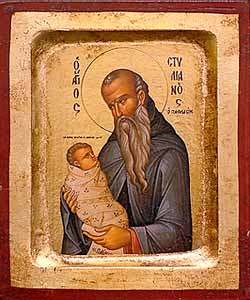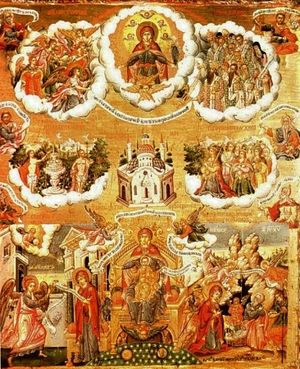Science
St. Gregory Palamas and the Tradition of the Fathers
12. March 2017 - 18:25 "Following the Holy Fathers" ... It was usual in the Ancient Church to introduce doctrinal statements by phrases like this.
"Following the Holy Fathers" ... It was usual in the Ancient Church to introduce doctrinal statements by phrases like this.
The Decree of Chalcedon opens precisely with these very words. The Seventh Ecumenical Council introduces its decision concerning the Holy Icons in a more elaborate way: "Following the Divinely inspired teaching of the Holy Fathers and the Tradition of the Catholic Church." The didaskalia of the Fathers is the formal and normative term of reference.
When Should Children Begin to Fast?
8. March 2017 - 13:19  Take possession of your stomach, before it takes possession of you. —St. John Climacus
Take possession of your stomach, before it takes possession of you. —St. John Climacus
How early should children begin fasting? According to the teaching of the ancient fathers, a healthy child begins to fast once it no longer takes its mother’s milk, that is, at around age three. (In ancient times, Jewish women breastfed their infants until they reached three years of age). Along with the need to observe whatever degree of fasting, parents must also take care to prevent their children from forming a habit of overeating, or eating too often, outside of the times established for taking food—eating between meals. St. Theophan the Recluse gives parents advice in this regard: “A child should eat in such a way that while developing and fortifying the body and giving it health, he does not foment flesh-pleasing in the soul. Regardless of how young your child is, he must begin from the earliest years to stabilize the flesh, which leans toward coarse matter, and accustom it to self control, so that in both the childhood and teenage years and beyond, he can easily and freely control this need.”
Sunday of Orthodoxy
6. March 2017 - 12:24 Rejoicing today in the triumph of Orthodoxy on this first Sunday of Lent, we joyfully commemorate three events: one event belonging to the past; one event to the present; and one event which still belongs to the future.
Rejoicing today in the triumph of Orthodoxy on this first Sunday of Lent, we joyfully commemorate three events: one event belonging to the past; one event to the present; and one event which still belongs to the future.
In the name of the Father, and of the Son, and of the Holy Spirit. Amen.
Rejoicing today in the triumph of Orthodoxy on this first Sunday of Lent, we joyfully commemorate three events: one event belonging to the past; one event to the present; and one event which still belongs to the future.
Whenever we have any feast or joy in the Church, we Orthodox first of all look back - for in our present life we depend on what happened in the past. We depend first of all, of course, on the first and the ultimate triumph - that of Christ Himself. Our faith is rooted in that strange defeat which became the most glorious victory - the defeat of a man nailed to the cross, who rose again from the dead, who is the Lord and the Master of the world. This is the first triumph of Orthodoxy.
The Synodikon of the Holy, Great, Ecumenical Council, the Second of Nicaea: 787
3. March 2017 - 14:53 From the Proceedings of the Seventh Ecumenical Council
From the Proceedings of the Seventh Ecumenical Council
The holy, great, and Ecumenical Council, which, by the grace of God and the will of the pious and Christ-loving Emperors, Constantine and Irene, his mother, was gathered together for the second time at Nice, the illustrious metropolis of Bithynia, in the holy church of God which is named Sophia, having followed the tradition of the Catholic Church, hath defined as follows: Christ our Lord, who hath bestowed upon us the light of the knowledge of himself, and hath redeemed us from the darkness of idolatrous madness, having espoused to himself the Holy Catholic Church without spot or defect, promised that he would so preserve her: and gave his word to this effect to his holy disciples when he said Lo! I am with you always, even unto the end of the world which promise he made, not only to them, but to us also who should believe in his name through their word.
A Preparation for Confession
3. March 2017 - 12:56 I, a sinful soul, confess to our Lord God and Savior Jesus Christ, all of my evil acts which I have done, said or thought from baptism even unto this present day.
I, a sinful soul, confess to our Lord God and Savior Jesus Christ, all of my evil acts which I have done, said or thought from baptism even unto this present day.
I have not kept the vows of my baptism, but have made myself unwanted before the face of God.
What Is Necessary for a Saving Confession?
3. March 2017 - 12:53 What is Confession? Confession is the oral avowal of one’s sins that lie heavy upon the conscience. Repentance cleanses the soul and makes it ready to receive the Holy Spirit, but confession, so to speak, only empties the soul of sins.
What is Confession? Confession is the oral avowal of one’s sins that lie heavy upon the conscience. Repentance cleanses the soul and makes it ready to receive the Holy Spirit, but confession, so to speak, only empties the soul of sins.
Let us present a simple analogy and comparison to confession. For example, suppose you had only one vessel of some kind, which you through negligence or laziness let reach a stage where little by little it accumulated all sorts of dirt so that your vessel became not only unusable but even unbearable to look at without repugnance.

